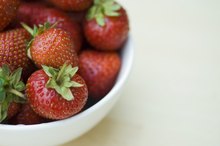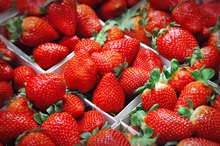Foods to Avoid Because of Vulvodynia
Vulvodynia is a condition of chronic pain of the vulva region with no identifiable cause. The most common symptom is burning pain and other symptoms may include redness, swelling, itching, and sharp or stinging pain. The pain may be constant or may disappear and recur. The cause of vulvodynia is unknown. Chronic pain is often disruptive to the patient's everyday life and health but there are medications to help manage the symptoms of vulvodynia. In addition, some women find relief by making dietary changes.
Fruits and Vegetables
In general, many types of green leafy vegetables and berries are high in oxalate and should be avoided. Spinach, Swiss chard, leeks, okra, beet greens and beet root have more than 50 mg of oxalate per serving. Collard greens, dandelion green and mustard greens contain slightly less but should be avoided by those seeking to treat vulvodynia. Among fruits, elderberries, gooseberries, figs and star fruit are have the highest oxalate content, followed by blackberries, raspberries, Concord grapes and blueberries.
Nuts and Legumes
Essiac Tea Side Effects
Learn More
Many varieties of nuts and beans have high oxalate content. Peanuts, almonds, hazelnuts, pistachios, pecans, sesame seeds, lentils and refried beans contain more than 50 mg of oxalate per serving. Baked beans, green beans and kidney beans have moderately high amounts of oxalate, in the range of 10 to 50 mg per serving.
Beverages
For brewed beverages, the oxalate content will vary with the strength of the beverage. Most doctors recommend that you avoid all brewed and instant coffee, tea and cocoa. Dark, draft beer is also high in oxalate so choose lighter bottled varieties. Drink plenty of clear fluids, especially water, to replace other beverages.
Related Articles
References
Writer Bio
Amy Liddell has been writing on health and medicine since 2004. She is also a biomedical scientist and studies human cancer. Her articles have appeared in scientific journals, medical textbooks and on health-related consumer websites. Liddell holds a Doctor of Philosophy in biological and biomedical sciences from Harvard University.









